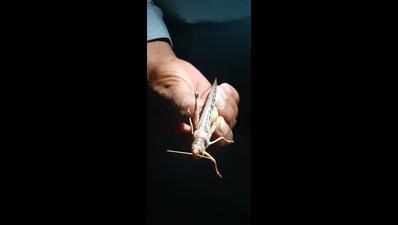- News
- City News
- nagpur News
- Maharashtra: Smaller locust swarms damaging veggie, fruit crops
Trending
This story is from May 30, 2020
Maharashtra: Smaller locust swarms damaging veggie, fruit crops
The relief from locusts was short-lived for farmers and state’s agriculture department officials. On Thursday, a swarm was headed towards Balaghat district of Madhya Pradesh from Gondia leaving Vidarbha in the afternoon. Late Thursday night, however, another swarm was seen in Ramtek and at Mouda by Friday evening, said the department’s officials.

Representative image
NAGPUR: The relief from locusts was short-lived for farmers and state’s agriculture department officials. On Thursday, a swarm was headed towards Balaghat district of Madhya Pradesh from Gondia leaving Vidarbha in the afternoon. Late Thursday night, however, another swarm was seen in Ramtek and at Mouda by Friday evening, said the department’s officials.
It is expected that earlier spraying took a major toll on the pests and the swarms have split, said sources in agriculture department.
The officials geared up to spray pesticide at the villages in Mouda where the pest was last spotted after sundown, said the joint director agriculture (JDA), Ravindra Bhosle. The swarm near Ramtek was around 1km in length and 500 metres in breadth.
Another swarm was headed towards Narkhed in Nagpur district from Warud in Amravati district. This was 2km long, said an official. This locust is expected to enter Wardha district and find a resting place near the upper wardha irrigation project. The pest prefers marshy areas to settle, they said.
Asha Daga from Nagpur who has a farm at Nagalwadi in Saoner said on Thursday there was an attack on her farm too. “We could see locusts on our entire 24 acres holding. They were hovering over other farms also,” Daga told TOI.
She said her crop of apple ber, bananas, lady’s finger and cow pea were affected. Other farmers have been affected too, she said.
A team of experts of Panjabrao Deshmukh Krishi Vidyapeeth (PDKV) visited the sites that could be possible areas for egg-laying. However, no traces were of locust eggs were found. The experts said temperature has to be around 37 degrees for egg-laying, and its over 46 degrees now, a source said.
It is expected that earlier spraying took a major toll on the pests and the swarms have split, said sources in agriculture department.
The officials geared up to spray pesticide at the villages in Mouda where the pest was last spotted after sundown, said the joint director agriculture (JDA), Ravindra Bhosle. The swarm near Ramtek was around 1km in length and 500 metres in breadth.
Another swarm was headed towards Narkhed in Nagpur district from Warud in Amravati district. This was 2km long, said an official. This locust is expected to enter Wardha district and find a resting place near the upper wardha irrigation project. The pest prefers marshy areas to settle, they said.
At Narkhed, the pest devoured leaflets of orange and sweet lime trees. The losses to orchards were marginal, but vegetable crops were almost completely eaten, said an official.
Asha Daga from Nagpur who has a farm at Nagalwadi in Saoner said on Thursday there was an attack on her farm too. “We could see locusts on our entire 24 acres holding. They were hovering over other farms also,” Daga told TOI.
She said her crop of apple ber, bananas, lady’s finger and cow pea were affected. Other farmers have been affected too, she said.
A team of experts of Panjabrao Deshmukh Krishi Vidyapeeth (PDKV) visited the sites that could be possible areas for egg-laying. However, no traces were of locust eggs were found. The experts said temperature has to be around 37 degrees for egg-laying, and its over 46 degrees now, a source said.
End of Article
FOLLOW US ON SOCIAL MEDIA










